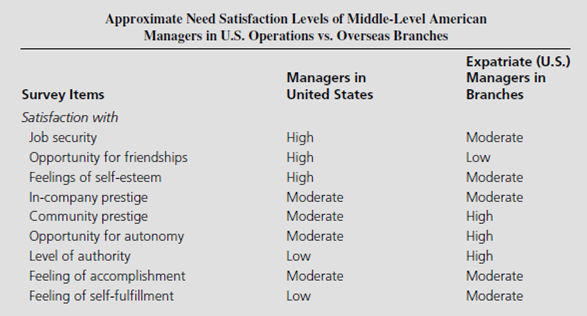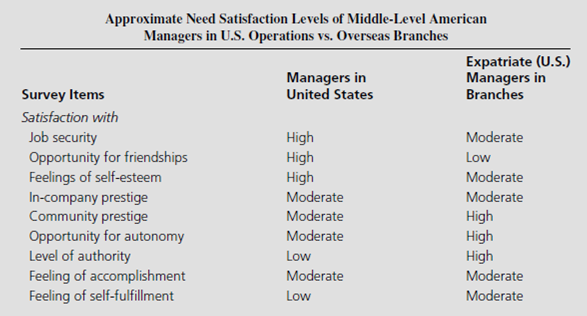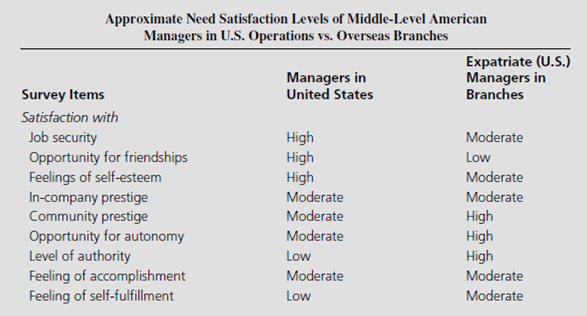Deck 16: Organisational Behavior Across Cultures
Question
Question
Question
Question
Question
Question
Question
Question
Question
Question
Question
Question
Question
Question

Unlock Deck
Sign up to unlock the cards in this deck!
Unlock Deck
Unlock Deck
1/14
Play
Full screen (f)
Deck 16: Organisational Behavior Across Cultures
1
What experiences have you had dealing directly with individuals from other international cultures? What lessons have you learned from doing so?
Cultural Differences:
Cultures and traditions vary vastly from places to places and every individual has different response towards these different cultures. An individual who works and deals directly with people from different culture can learn and experience many new things.
Let's understand the experience that an individual may encounter if he is working in a multi-cultured company:
• People may have a different attitude towards deadlines and time adherence. For some people, time adherence is extremely important and for some, it might not be that important.
• A casual conversation at work may be considered okay by some people during work hours or during business meetings but in some cultures, such conversations might be considered a waste of time and such people will generally like to address business issues as soon as possible.
• In some cultures, personal space is considered very important and people may get uncomfortable if their personal space is violated but in some parts of the world, there is no such concept as personal space.
• Some cultures known as high context cultures give a lot of importance to the non-verbal communication and they rely heavily on such conversation to communicate their message whereas in low context culture people rely solely on the words that are spoken or on direct communication.
• Language is also another important difference that is present between different culture. A word may mean something in one culture and totally opposite in another one. This is a major difference that a person may experience while working with people from different cultures.
Cultures and traditions vary vastly from places to places and every individual has different response towards these different cultures. An individual who works and deals directly with people from different culture can learn and experience many new things.
Let's understand the experience that an individual may encounter if he is working in a multi-cultured company:
• People may have a different attitude towards deadlines and time adherence. For some people, time adherence is extremely important and for some, it might not be that important.
• A casual conversation at work may be considered okay by some people during work hours or during business meetings but in some cultures, such conversations might be considered a waste of time and such people will generally like to address business issues as soon as possible.
• In some cultures, personal space is considered very important and people may get uncomfortable if their personal space is violated but in some parts of the world, there is no such concept as personal space.
• Some cultures known as high context cultures give a lot of importance to the non-verbal communication and they rely heavily on such conversation to communicate their message whereas in low context culture people rely solely on the words that are spoken or on direct communication.
• Language is also another important difference that is present between different culture. A word may mean something in one culture and totally opposite in another one. This is a major difference that a person may experience while working with people from different cultures.
2
Identify a variety of ways in which you could prepare yourself for possible international assignment as an expatriate. How long might this process take?
Expatriate:
Expatriates are the experts that represent a company in a foreign country. They handle major business activities and ensure that the business operations are running as per the company standards and policies. Their posting might be temporary or permanent.
If person A is to be posted in a foreign country as an expatriate, then he can take the following measures to prepare himself for the posting:
• He can take language lessons in that region's language. It will help him to better adjust to the new culture and it will also act as a goodwill among the citizens of a different country that someone is trying to adapt to their culture.
• He should do research about the culture, social norms, traditions and about the history of the region. This will help him in a better understanding of the reasoning behind the behaviour of the people.
• He can join groups that consist of people from his future posting region. He can observe the behaviour of those people to have a better understanding. He can also benefit from such groups as people will act as a mentor and help him in his journey to better adapt to the new culture.
• He can ensure that there is someone in a foreign country that can help him in settling down within a few weeks of his arrival. This person can be a friend, or he can be hired as a personal assistant, preferably a local citizen of the host country,
• He should ensure that his basic needs are arranged for even before he lands in a foreign country. His stay, transportation and food should be arranged before he leaves for the new country.
Expatriates are the experts that represent a company in a foreign country. They handle major business activities and ensure that the business operations are running as per the company standards and policies. Their posting might be temporary or permanent.
If person A is to be posted in a foreign country as an expatriate, then he can take the following measures to prepare himself for the posting:
• He can take language lessons in that region's language. It will help him to better adjust to the new culture and it will also act as a goodwill among the citizens of a different country that someone is trying to adapt to their culture.
• He should do research about the culture, social norms, traditions and about the history of the region. This will help him in a better understanding of the reasoning behind the behaviour of the people.
• He can join groups that consist of people from his future posting region. He can observe the behaviour of those people to have a better understanding. He can also benefit from such groups as people will act as a mentor and help him in his journey to better adapt to the new culture.
• He can ensure that there is someone in a foreign country that can help him in settling down within a few weeks of his arrival. This person can be a friend, or he can be hired as a personal assistant, preferably a local citizen of the host country,
• He should ensure that his basic needs are arranged for even before he lands in a foreign country. His stay, transportation and food should be arranged before he leaves for the new country.
3
Select a foreign country that has recently been in the news. Seek information about key social, legal, ethical, political, and economic factors that would help a manager who is about to move there to understand that country's culture.
First, students should look for evidence indicating parochialism, ethnocentrism, and cultural shock in the country being investigated. Examination of social and political issues should also help students to gain insight into the extent to which individualism/collectivism, uncertainty avoidance, power distance, and masculinity/femininity affect the news about the country they are examining.
4
An insight is a new and clear perception of a phenomenon, or an acquired ability to "see" clearly something you were unaware of previously. It is sometimes simply referred to as an "ah-ha! moment," in which you have a minirevelation or reach a straightforward conclusion about a topic or issue.
Insights need not necessarily be dramatic, for what is an insight to one person may be less important to another. The critical feature of insights is that they are relevant and memorable for you; they should represent new knowledge, new frameworks, or new ways of viewing things you want to retain and remember over time.
Insights, then, are different from the information you find in the "Advice for Future Managers" boxes within the text. That advice is prescriptive and action-oriented; it indicates a recommended course of action.
A useful way to think of OB insights is to assume you are the only person who has read Chapter 16. You have been given the assignment to highlight, in your own words, the major concepts (not just summarize the whole chapter) that might stand out for a naive audience who has never heard of the topic before. What 10 insights would you share with them?
(Example) Expatriates returning home may experience a reverse cultural shock that is equally strong as when they departed for a foreign assignment.
1. _________________________
2. _________________________
3. _________________________
4. _________________________
5. _________________________
6. _________________________
7. _________________________
8. _________________________
9. _________________________
10. ________________________
Insights need not necessarily be dramatic, for what is an insight to one person may be less important to another. The critical feature of insights is that they are relevant and memorable for you; they should represent new knowledge, new frameworks, or new ways of viewing things you want to retain and remember over time.
Insights, then, are different from the information you find in the "Advice for Future Managers" boxes within the text. That advice is prescriptive and action-oriented; it indicates a recommended course of action.
A useful way to think of OB insights is to assume you are the only person who has read Chapter 16. You have been given the assignment to highlight, in your own words, the major concepts (not just summarize the whole chapter) that might stand out for a naive audience who has never heard of the topic before. What 10 insights would you share with them?
(Example) Expatriates returning home may experience a reverse cultural shock that is equally strong as when they departed for a foreign assignment.
1. _________________________
2. _________________________
3. _________________________
4. _________________________
5. _________________________
6. _________________________
7. _________________________
8. _________________________
9. _________________________
10. ________________________

Unlock Deck
Unlock for access to all 14 flashcards in this deck.
Unlock Deck
k this deck
5
The Piedmont Company
The Piedmont Company is a major multinational manufacturer with branch operations in several nations around the world. Its home office is in the United States, but it has sent expatriate managers to work in its various branches. The company recently conducted a survey of its middle managers to determine their relative levels of need satisfaction in their jobs. The results of the survey are reported in the following table:

Analyze the results shown, and give your interpretation of the kinds of problems that exist. Offer possible explanations for them.
The Piedmont Company is a major multinational manufacturer with branch operations in several nations around the world. Its home office is in the United States, but it has sent expatriate managers to work in its various branches. The company recently conducted a survey of its middle managers to determine their relative levels of need satisfaction in their jobs. The results of the survey are reported in the following table:

Analyze the results shown, and give your interpretation of the kinds of problems that exist. Offer possible explanations for them.

Unlock Deck
Unlock for access to all 14 flashcards in this deck.
Unlock Deck
k this deck
6
Identify firms in your region that are multinational. In what parts of the world do they operate? How recently have they become multinational? If possible, invite a representative of one of the firms to speak to the class about policies, experiences, and problems the firm has encountered in its multinational operations.

Unlock Deck
Unlock for access to all 14 flashcards in this deck.
Unlock Deck
k this deck
7
The Piedmont Company
The Piedmont Company is a major multinational manufacturer with branch operations in several nations around the world. Its home office is in the United States, but it has sent expatriate managers to work in its various branches. The company recently conducted a survey of its middle managers to determine their relative levels of need satisfaction in their jobs. The results of the survey are reported in the following table:

Prepare a set of recommendations for resolving or diminishing the problems you identified.
The Piedmont Company is a major multinational manufacturer with branch operations in several nations around the world. Its home office is in the United States, but it has sent expatriate managers to work in its various branches. The company recently conducted a survey of its middle managers to determine their relative levels of need satisfaction in their jobs. The results of the survey are reported in the following table:

Prepare a set of recommendations for resolving or diminishing the problems you identified.

Unlock Deck
Unlock for access to all 14 flashcards in this deck.
Unlock Deck
k this deck
8
Examine the five factors that represent major individual differences across cultures (e.g., power distance). To what degree do you fit the image of a person from your country on those particular dimensions? Could you work with someone with the opposite characteristics? Explain.

Unlock Deck
Unlock for access to all 14 flashcards in this deck.
Unlock Deck
k this deck
9
The Piedmont Company
The Piedmont Company is a major multinational manufacturer with branch operations in several nations around the world. Its home office is in the United States, but it has sent expatriate managers to work in its various branches. The company recently conducted a survey of its middle managers to determine their relative levels of need satisfaction in their jobs. The results of the survey are reported in the following table:

Speculate about what the results might look like if the nonsupervisory employees in each country had been surveyed. What is the basis for your conclusions?
The Piedmont Company is a major multinational manufacturer with branch operations in several nations around the world. Its home office is in the United States, but it has sent expatriate managers to work in its various branches. The company recently conducted a survey of its middle managers to determine their relative levels of need satisfaction in their jobs. The results of the survey are reported in the following table:

Speculate about what the results might look like if the nonsupervisory employees in each country had been surveyed. What is the basis for your conclusions?

Unlock Deck
Unlock for access to all 14 flashcards in this deck.
Unlock Deck
k this deck
10
Discuss the effects of parochialism and ethnocentrism. How would employees behave if they had those characteristics? How would you respond to workers from another country if they demonstrated those traits?

Unlock Deck
Unlock for access to all 14 flashcards in this deck.
Unlock Deck
k this deck
11
Think of a time when you may have experienced cultural shock. How did you react? How could you have better anticipated and prevented it? Is it possible to experience cultural shock by just traveling across the United States? Explain.

Unlock Deck
Unlock for access to all 14 flashcards in this deck.
Unlock Deck
k this deck
12
Evaluate the various recommendations for minimizing or overcoming barriers to cultural adaptation. Which do you think have the greatest likelihood of succeeding?

Unlock Deck
Unlock for access to all 14 flashcards in this deck.
Unlock Deck
k this deck
13
Which person do you predict will experience the greatest amount of cultural shock upon moving to a new country, the expatriate or that person's spouse (and children)? Why?

Unlock Deck
Unlock for access to all 14 flashcards in this deck.
Unlock Deck
k this deck
14
Offer several suggestions for preventing or at least minimizing the problem of cross-cultural reentry (reverse cultural shock).

Unlock Deck
Unlock for access to all 14 flashcards in this deck.
Unlock Deck
k this deck


